Justice & Change in a Global World
VerifiedAdded on 2021/05/27
|8
|2008
|175
AI Summary
Contribute Materials
Your contribution can guide someone’s learning journey. Share your
documents today.
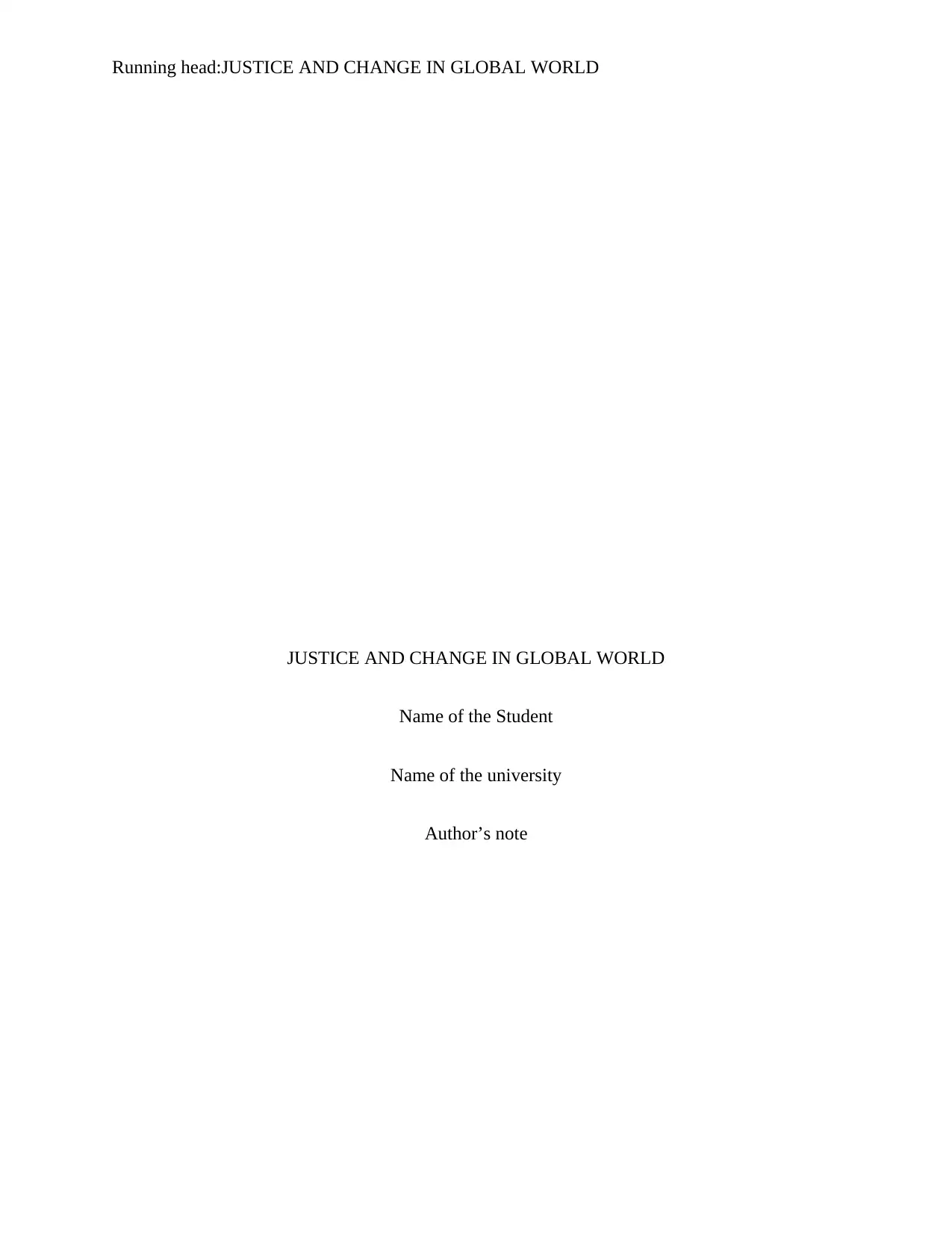
Running head:JUSTICE AND CHANGE IN GLOBAL WORLD
JUSTICE AND CHANGE IN GLOBAL WORLD
Name of the Student
Name of the university
Author’s note
JUSTICE AND CHANGE IN GLOBAL WORLD
Name of the Student
Name of the university
Author’s note
Secure Best Marks with AI Grader
Need help grading? Try our AI Grader for instant feedback on your assignments.
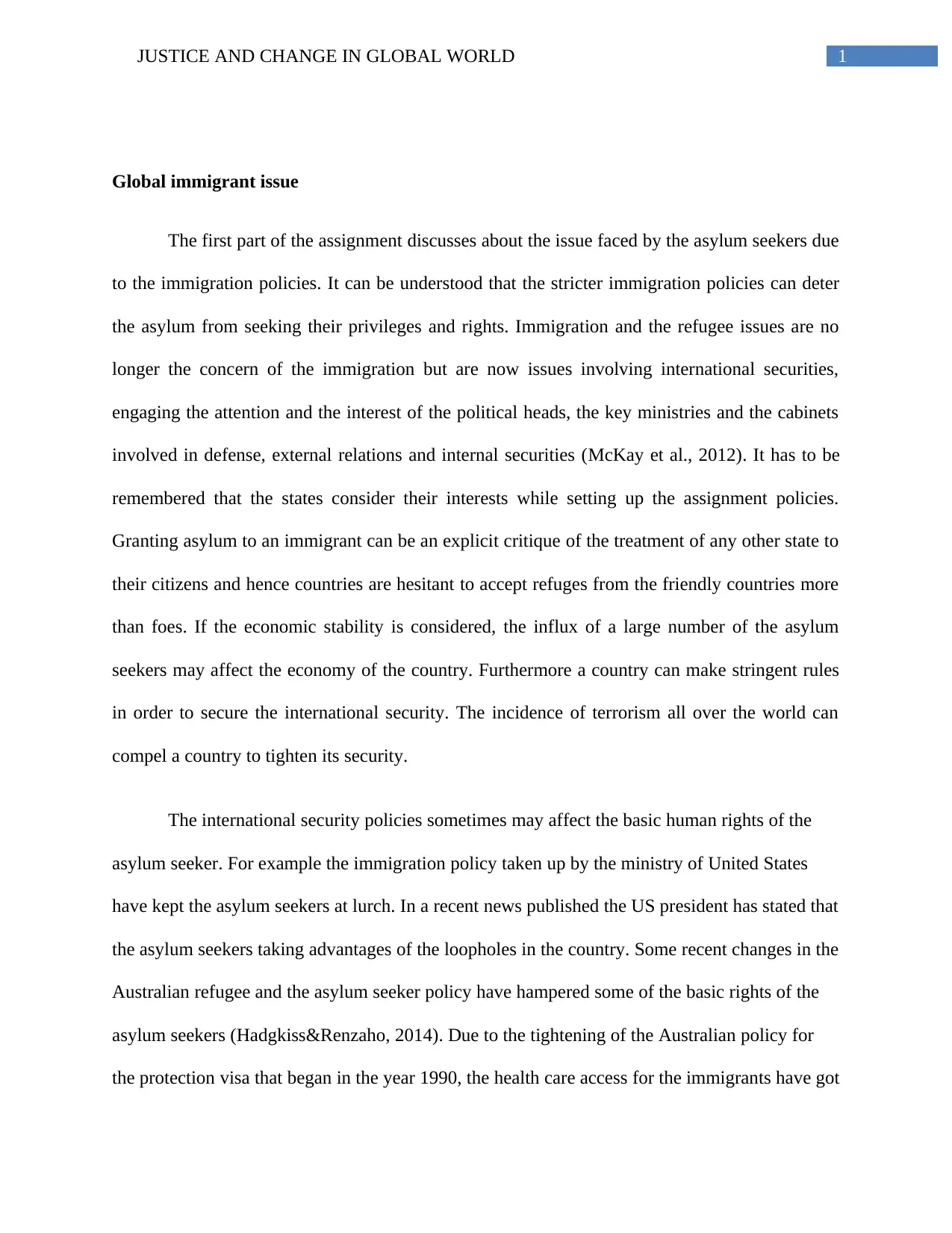
1JUSTICE AND CHANGE IN GLOBAL WORLD
Global immigrant issue
The first part of the assignment discusses about the issue faced by the asylum seekers due
to the immigration policies. It can be understood that the stricter immigration policies can deter
the asylum from seeking their privileges and rights. Immigration and the refugee issues are no
longer the concern of the immigration but are now issues involving international securities,
engaging the attention and the interest of the political heads, the key ministries and the cabinets
involved in defense, external relations and internal securities (McKay et al., 2012). It has to be
remembered that the states consider their interests while setting up the assignment policies.
Granting asylum to an immigrant can be an explicit critique of the treatment of any other state to
their citizens and hence countries are hesitant to accept refuges from the friendly countries more
than foes. If the economic stability is considered, the influx of a large number of the asylum
seekers may affect the economy of the country. Furthermore a country can make stringent rules
in order to secure the international security. The incidence of terrorism all over the world can
compel a country to tighten its security.
The international security policies sometimes may affect the basic human rights of the
asylum seeker. For example the immigration policy taken up by the ministry of United States
have kept the asylum seekers at lurch. In a recent news published the US president has stated that
the asylum seekers taking advantages of the loopholes in the country. Some recent changes in the
Australian refugee and the asylum seeker policy have hampered some of the basic rights of the
asylum seekers (Hadgkiss&Renzaho, 2014). Due to the tightening of the Australian policy for
the protection visa that began in the year 1990, the health care access for the immigrants have got
Global immigrant issue
The first part of the assignment discusses about the issue faced by the asylum seekers due
to the immigration policies. It can be understood that the stricter immigration policies can deter
the asylum from seeking their privileges and rights. Immigration and the refugee issues are no
longer the concern of the immigration but are now issues involving international securities,
engaging the attention and the interest of the political heads, the key ministries and the cabinets
involved in defense, external relations and internal securities (McKay et al., 2012). It has to be
remembered that the states consider their interests while setting up the assignment policies.
Granting asylum to an immigrant can be an explicit critique of the treatment of any other state to
their citizens and hence countries are hesitant to accept refuges from the friendly countries more
than foes. If the economic stability is considered, the influx of a large number of the asylum
seekers may affect the economy of the country. Furthermore a country can make stringent rules
in order to secure the international security. The incidence of terrorism all over the world can
compel a country to tighten its security.
The international security policies sometimes may affect the basic human rights of the
asylum seeker. For example the immigration policy taken up by the ministry of United States
have kept the asylum seekers at lurch. In a recent news published the US president has stated that
the asylum seekers taking advantages of the loopholes in the country. Some recent changes in the
Australian refugee and the asylum seeker policy have hampered some of the basic rights of the
asylum seekers (Hadgkiss&Renzaho, 2014). Due to the tightening of the Australian policy for
the protection visa that began in the year 1990, the health care access for the immigrants have got
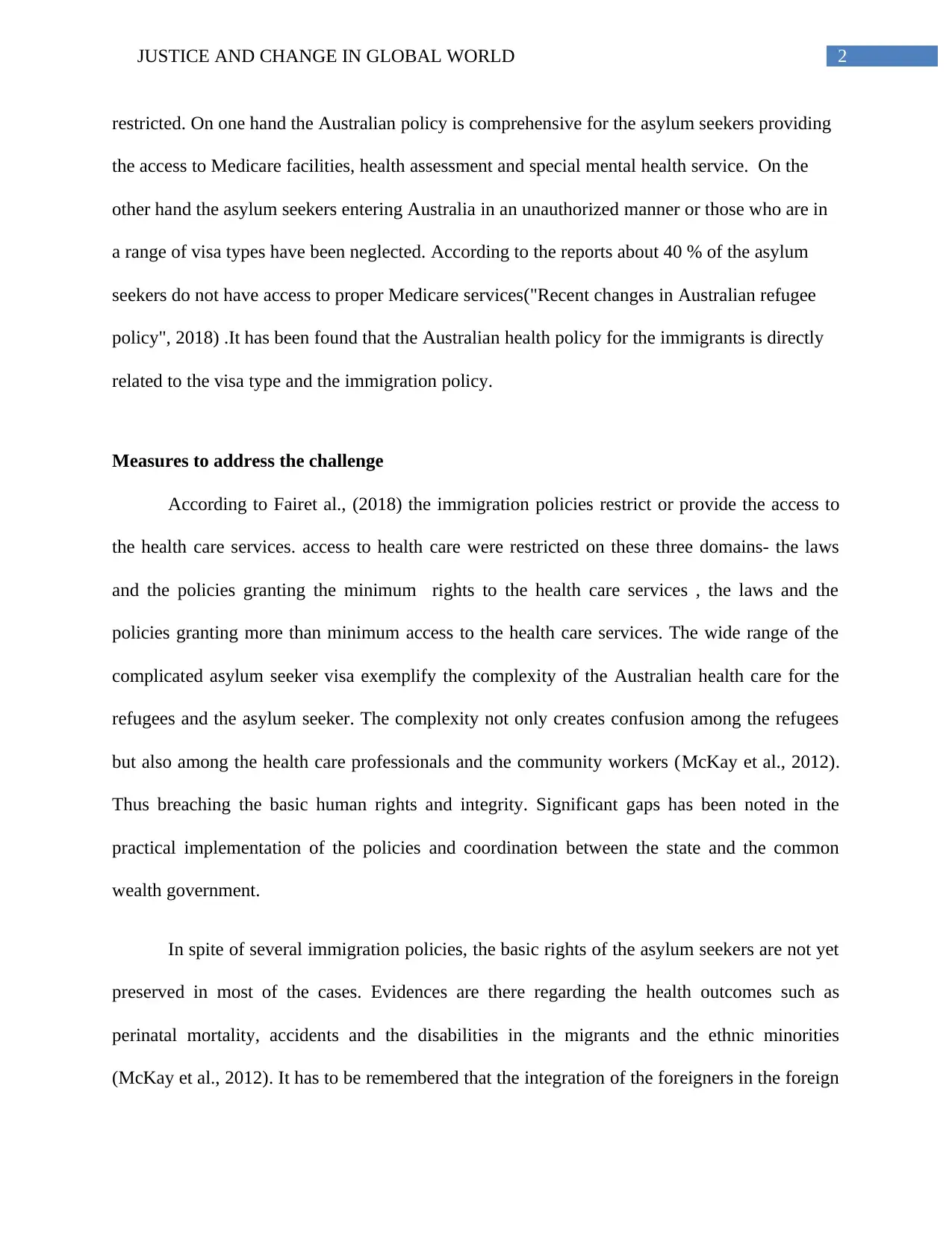
2JUSTICE AND CHANGE IN GLOBAL WORLD
restricted. On one hand the Australian policy is comprehensive for the asylum seekers providing
the access to Medicare facilities, health assessment and special mental health service. On the
other hand the asylum seekers entering Australia in an unauthorized manner or those who are in
a range of visa types have been neglected. According to the reports about 40 % of the asylum
seekers do not have access to proper Medicare services("Recent changes in Australian refugee
policy", 2018) .It has been found that the Australian health policy for the immigrants is directly
related to the visa type and the immigration policy.
Measures to address the challenge
According to Fairet al., (2018) the immigration policies restrict or provide the access to
the health care services. access to health care were restricted on these three domains- the laws
and the policies granting the minimum rights to the health care services , the laws and the
policies granting more than minimum access to the health care services. The wide range of the
complicated asylum seeker visa exemplify the complexity of the Australian health care for the
refugees and the asylum seeker. The complexity not only creates confusion among the refugees
but also among the health care professionals and the community workers (McKay et al., 2012).
Thus breaching the basic human rights and integrity. Significant gaps has been noted in the
practical implementation of the policies and coordination between the state and the common
wealth government.
In spite of several immigration policies, the basic rights of the asylum seekers are not yet
preserved in most of the cases. Evidences are there regarding the health outcomes such as
perinatal mortality, accidents and the disabilities in the migrants and the ethnic minorities
(McKay et al., 2012). It has to be remembered that the integration of the foreigners in the foreign
restricted. On one hand the Australian policy is comprehensive for the asylum seekers providing
the access to Medicare facilities, health assessment and special mental health service. On the
other hand the asylum seekers entering Australia in an unauthorized manner or those who are in
a range of visa types have been neglected. According to the reports about 40 % of the asylum
seekers do not have access to proper Medicare services("Recent changes in Australian refugee
policy", 2018) .It has been found that the Australian health policy for the immigrants is directly
related to the visa type and the immigration policy.
Measures to address the challenge
According to Fairet al., (2018) the immigration policies restrict or provide the access to
the health care services. access to health care were restricted on these three domains- the laws
and the policies granting the minimum rights to the health care services , the laws and the
policies granting more than minimum access to the health care services. The wide range of the
complicated asylum seeker visa exemplify the complexity of the Australian health care for the
refugees and the asylum seeker. The complexity not only creates confusion among the refugees
but also among the health care professionals and the community workers (McKay et al., 2012).
Thus breaching the basic human rights and integrity. Significant gaps has been noted in the
practical implementation of the policies and coordination between the state and the common
wealth government.
In spite of several immigration policies, the basic rights of the asylum seekers are not yet
preserved in most of the cases. Evidences are there regarding the health outcomes such as
perinatal mortality, accidents and the disabilities in the migrants and the ethnic minorities
(McKay et al., 2012). It has to be remembered that the integration of the foreigners in the foreign
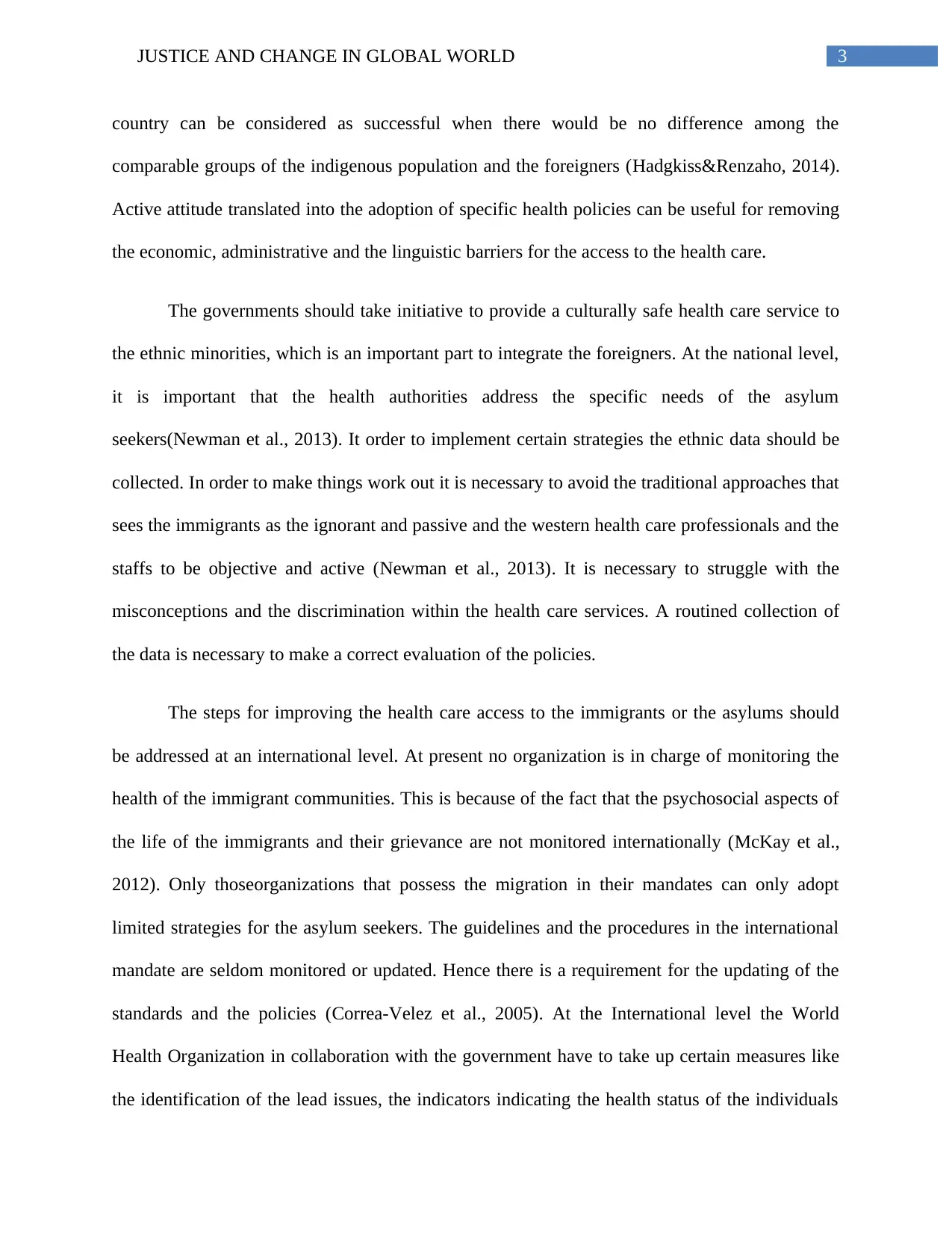
3JUSTICE AND CHANGE IN GLOBAL WORLD
country can be considered as successful when there would be no difference among the
comparable groups of the indigenous population and the foreigners (Hadgkiss&Renzaho, 2014).
Active attitude translated into the adoption of specific health policies can be useful for removing
the economic, administrative and the linguistic barriers for the access to the health care.
The governments should take initiative to provide a culturally safe health care service to
the ethnic minorities, which is an important part to integrate the foreigners. At the national level,
it is important that the health authorities address the specific needs of the asylum
seekers(Newman et al., 2013). It order to implement certain strategies the ethnic data should be
collected. In order to make things work out it is necessary to avoid the traditional approaches that
sees the immigrants as the ignorant and passive and the western health care professionals and the
staffs to be objective and active (Newman et al., 2013). It is necessary to struggle with the
misconceptions and the discrimination within the health care services. A routined collection of
the data is necessary to make a correct evaluation of the policies.
The steps for improving the health care access to the immigrants or the asylums should
be addressed at an international level. At present no organization is in charge of monitoring the
health of the immigrant communities. This is because of the fact that the psychosocial aspects of
the life of the immigrants and their grievance are not monitored internationally (McKay et al.,
2012). Only thoseorganizations that possess the migration in their mandates can only adopt
limited strategies for the asylum seekers. The guidelines and the procedures in the international
mandate are seldom monitored or updated. Hence there is a requirement for the updating of the
standards and the policies (Correa-Velez et al., 2005). At the International level the World
Health Organization in collaboration with the government have to take up certain measures like
the identification of the lead issues, the indicators indicating the health status of the individuals
country can be considered as successful when there would be no difference among the
comparable groups of the indigenous population and the foreigners (Hadgkiss&Renzaho, 2014).
Active attitude translated into the adoption of specific health policies can be useful for removing
the economic, administrative and the linguistic barriers for the access to the health care.
The governments should take initiative to provide a culturally safe health care service to
the ethnic minorities, which is an important part to integrate the foreigners. At the national level,
it is important that the health authorities address the specific needs of the asylum
seekers(Newman et al., 2013). It order to implement certain strategies the ethnic data should be
collected. In order to make things work out it is necessary to avoid the traditional approaches that
sees the immigrants as the ignorant and passive and the western health care professionals and the
staffs to be objective and active (Newman et al., 2013). It is necessary to struggle with the
misconceptions and the discrimination within the health care services. A routined collection of
the data is necessary to make a correct evaluation of the policies.
The steps for improving the health care access to the immigrants or the asylums should
be addressed at an international level. At present no organization is in charge of monitoring the
health of the immigrant communities. This is because of the fact that the psychosocial aspects of
the life of the immigrants and their grievance are not monitored internationally (McKay et al.,
2012). Only thoseorganizations that possess the migration in their mandates can only adopt
limited strategies for the asylum seekers. The guidelines and the procedures in the international
mandate are seldom monitored or updated. Hence there is a requirement for the updating of the
standards and the policies (Correa-Velez et al., 2005). At the International level the World
Health Organization in collaboration with the government have to take up certain measures like
the identification of the lead issues, the indicators indicating the health status of the individuals
Secure Best Marks with AI Grader
Need help grading? Try our AI Grader for instant feedback on your assignments.
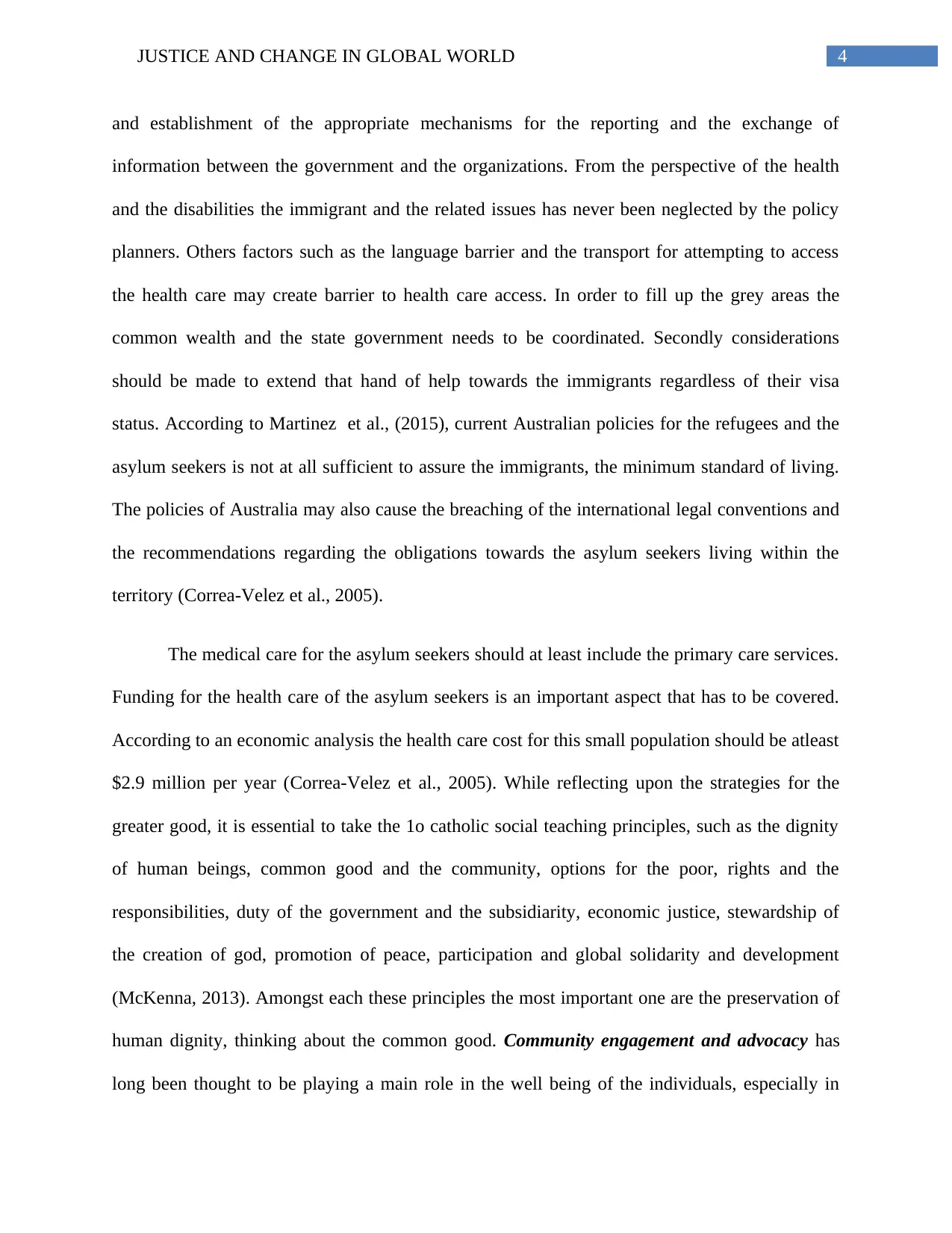
4JUSTICE AND CHANGE IN GLOBAL WORLD
and establishment of the appropriate mechanisms for the reporting and the exchange of
information between the government and the organizations. From the perspective of the health
and the disabilities the immigrant and the related issues has never been neglected by the policy
planners. Others factors such as the language barrier and the transport for attempting to access
the health care may create barrier to health care access. In order to fill up the grey areas the
common wealth and the state government needs to be coordinated. Secondly considerations
should be made to extend that hand of help towards the immigrants regardless of their visa
status. According to Martinez et al., (2015), current Australian policies for the refugees and the
asylum seekers is not at all sufficient to assure the immigrants, the minimum standard of living.
The policies of Australia may also cause the breaching of the international legal conventions and
the recommendations regarding the obligations towards the asylum seekers living within the
territory (Correa-Velez et al., 2005).
The medical care for the asylum seekers should at least include the primary care services.
Funding for the health care of the asylum seekers is an important aspect that has to be covered.
According to an economic analysis the health care cost for this small population should be atleast
$2.9 million per year (Correa-Velez et al., 2005). While reflecting upon the strategies for the
greater good, it is essential to take the 1o catholic social teaching principles, such as the dignity
of human beings, common good and the community, options for the poor, rights and the
responsibilities, duty of the government and the subsidiarity, economic justice, stewardship of
the creation of god, promotion of peace, participation and global solidarity and development
(McKenna, 2013). Amongst each these principles the most important one are the preservation of
human dignity, thinking about the common good. Community engagement and advocacy has
long been thought to be playing a main role in the well being of the individuals, especially in
and establishment of the appropriate mechanisms for the reporting and the exchange of
information between the government and the organizations. From the perspective of the health
and the disabilities the immigrant and the related issues has never been neglected by the policy
planners. Others factors such as the language barrier and the transport for attempting to access
the health care may create barrier to health care access. In order to fill up the grey areas the
common wealth and the state government needs to be coordinated. Secondly considerations
should be made to extend that hand of help towards the immigrants regardless of their visa
status. According to Martinez et al., (2015), current Australian policies for the refugees and the
asylum seekers is not at all sufficient to assure the immigrants, the minimum standard of living.
The policies of Australia may also cause the breaching of the international legal conventions and
the recommendations regarding the obligations towards the asylum seekers living within the
territory (Correa-Velez et al., 2005).
The medical care for the asylum seekers should at least include the primary care services.
Funding for the health care of the asylum seekers is an important aspect that has to be covered.
According to an economic analysis the health care cost for this small population should be atleast
$2.9 million per year (Correa-Velez et al., 2005). While reflecting upon the strategies for the
greater good, it is essential to take the 1o catholic social teaching principles, such as the dignity
of human beings, common good and the community, options for the poor, rights and the
responsibilities, duty of the government and the subsidiarity, economic justice, stewardship of
the creation of god, promotion of peace, participation and global solidarity and development
(McKenna, 2013). Amongst each these principles the most important one are the preservation of
human dignity, thinking about the common good. Community engagement and advocacy has
long been thought to be playing a main role in the well being of the individuals, especially in
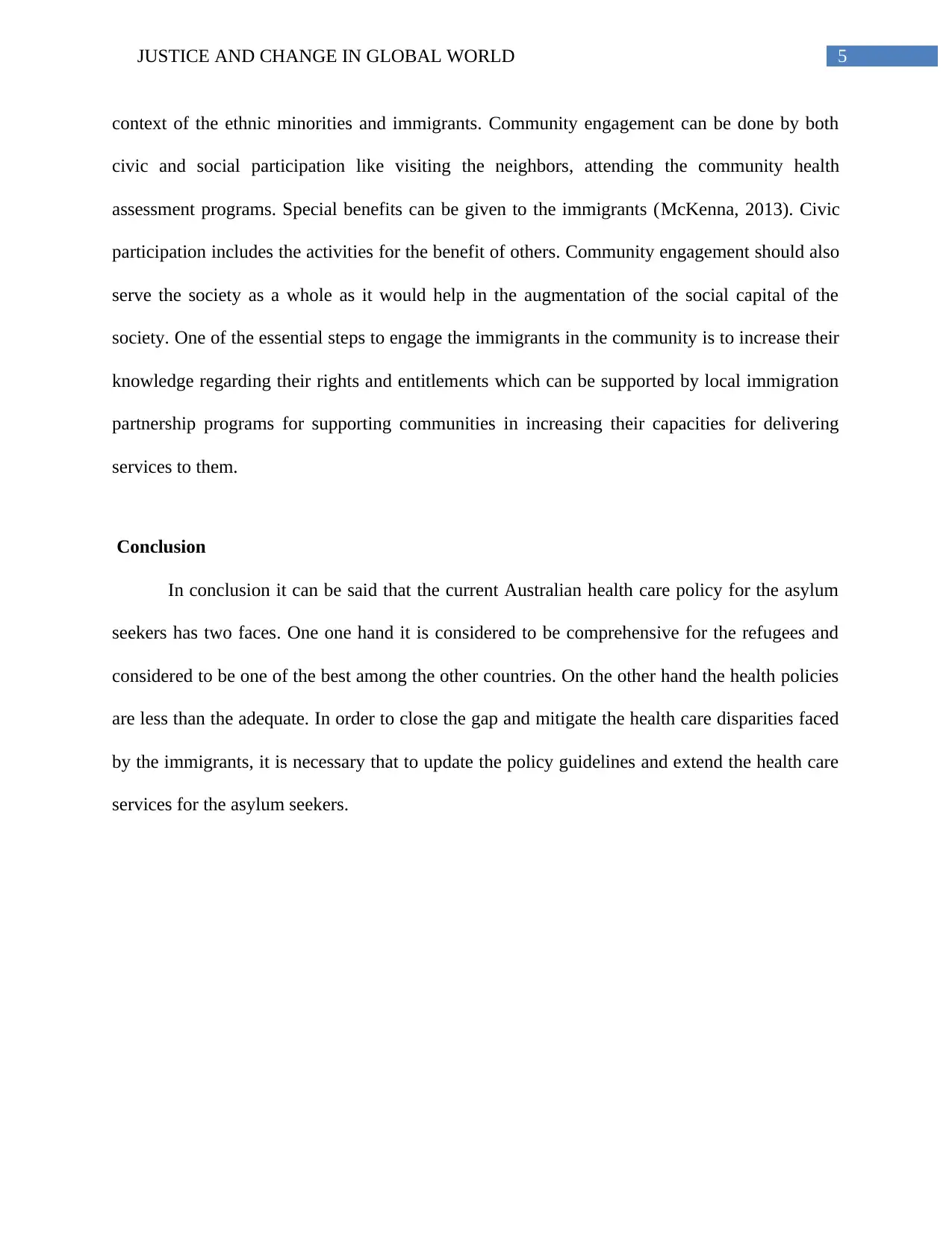
5JUSTICE AND CHANGE IN GLOBAL WORLD
context of the ethnic minorities and immigrants. Community engagement can be done by both
civic and social participation like visiting the neighbors, attending the community health
assessment programs. Special benefits can be given to the immigrants (McKenna, 2013). Civic
participation includes the activities for the benefit of others. Community engagement should also
serve the society as a whole as it would help in the augmentation of the social capital of the
society. One of the essential steps to engage the immigrants in the community is to increase their
knowledge regarding their rights and entitlements which can be supported by local immigration
partnership programs for supporting communities in increasing their capacities for delivering
services to them.
Conclusion
In conclusion it can be said that the current Australian health care policy for the asylum
seekers has two faces. One one hand it is considered to be comprehensive for the refugees and
considered to be one of the best among the other countries. On the other hand the health policies
are less than the adequate. In order to close the gap and mitigate the health care disparities faced
by the immigrants, it is necessary that to update the policy guidelines and extend the health care
services for the asylum seekers.
context of the ethnic minorities and immigrants. Community engagement can be done by both
civic and social participation like visiting the neighbors, attending the community health
assessment programs. Special benefits can be given to the immigrants (McKenna, 2013). Civic
participation includes the activities for the benefit of others. Community engagement should also
serve the society as a whole as it would help in the augmentation of the social capital of the
society. One of the essential steps to engage the immigrants in the community is to increase their
knowledge regarding their rights and entitlements which can be supported by local immigration
partnership programs for supporting communities in increasing their capacities for delivering
services to them.
Conclusion
In conclusion it can be said that the current Australian health care policy for the asylum
seekers has two faces. One one hand it is considered to be comprehensive for the refugees and
considered to be one of the best among the other countries. On the other hand the health policies
are less than the adequate. In order to close the gap and mitigate the health care disparities faced
by the immigrants, it is necessary that to update the policy guidelines and extend the health care
services for the asylum seekers.
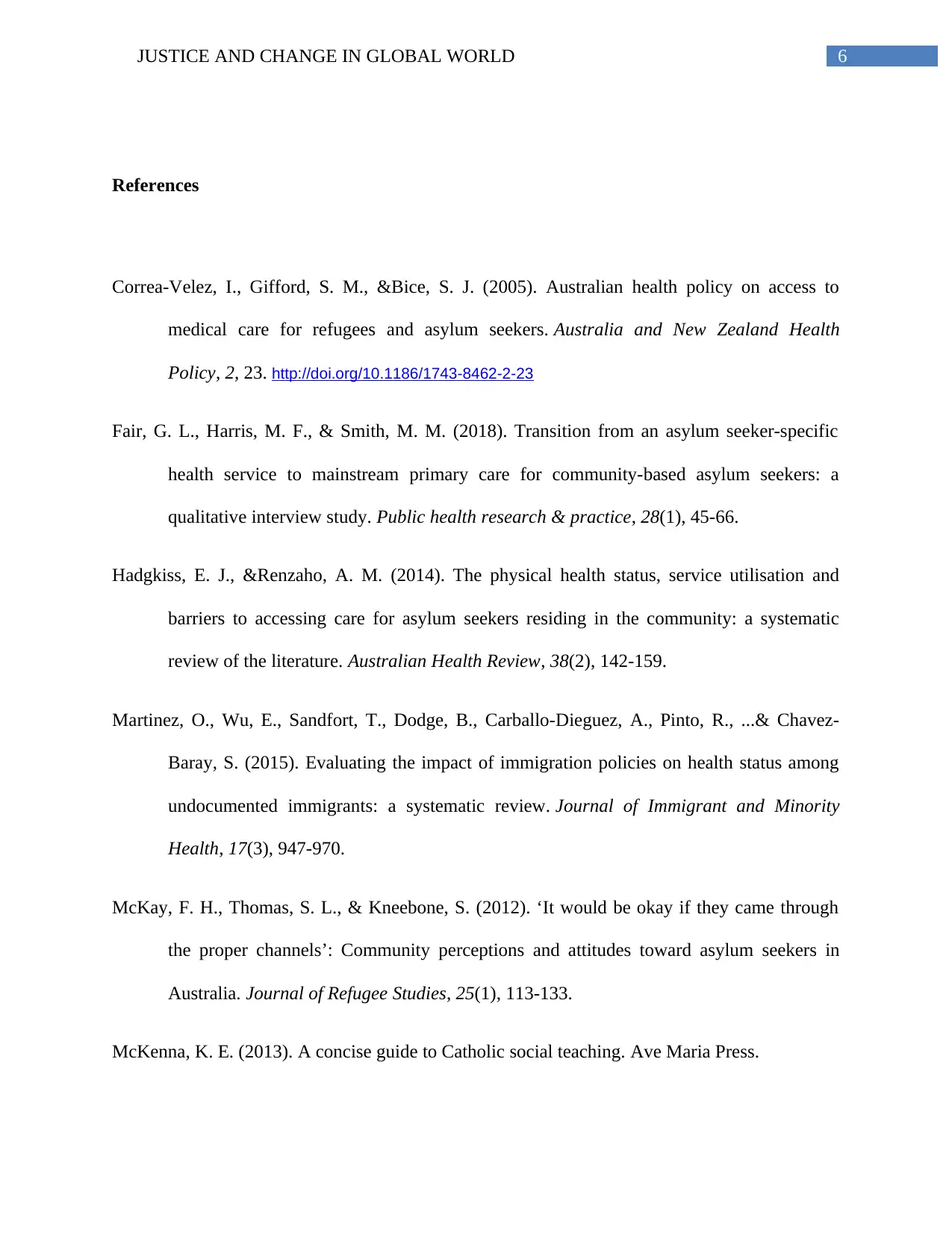
6JUSTICE AND CHANGE IN GLOBAL WORLD
References
Correa-Velez, I., Gifford, S. M., &Bice, S. J. (2005). Australian health policy on access to
medical care for refugees and asylum seekers. Australia and New Zealand Health
Policy, 2, 23. http://doi.org/10.1186/1743-8462-2-23
Fair, G. L., Harris, M. F., & Smith, M. M. (2018). Transition from an asylum seeker-specific
health service to mainstream primary care for community-based asylum seekers: a
qualitative interview study. Public health research & practice, 28(1), 45-66.
Hadgkiss, E. J., &Renzaho, A. M. (2014). The physical health status, service utilisation and
barriers to accessing care for asylum seekers residing in the community: a systematic
review of the literature. Australian Health Review, 38(2), 142-159.
Martinez, O., Wu, E., Sandfort, T., Dodge, B., Carballo-Dieguez, A., Pinto, R., ...& Chavez-
Baray, S. (2015). Evaluating the impact of immigration policies on health status among
undocumented immigrants: a systematic review. Journal of Immigrant and Minority
Health, 17(3), 947-970.
McKay, F. H., Thomas, S. L., & Kneebone, S. (2012). ‘It would be okay if they came through
the proper channels’: Community perceptions and attitudes toward asylum seekers in
Australia. Journal of Refugee Studies, 25(1), 113-133.
McKenna, K. E. (2013). A concise guide to Catholic social teaching. Ave Maria Press.
References
Correa-Velez, I., Gifford, S. M., &Bice, S. J. (2005). Australian health policy on access to
medical care for refugees and asylum seekers. Australia and New Zealand Health
Policy, 2, 23. http://doi.org/10.1186/1743-8462-2-23
Fair, G. L., Harris, M. F., & Smith, M. M. (2018). Transition from an asylum seeker-specific
health service to mainstream primary care for community-based asylum seekers: a
qualitative interview study. Public health research & practice, 28(1), 45-66.
Hadgkiss, E. J., &Renzaho, A. M. (2014). The physical health status, service utilisation and
barriers to accessing care for asylum seekers residing in the community: a systematic
review of the literature. Australian Health Review, 38(2), 142-159.
Martinez, O., Wu, E., Sandfort, T., Dodge, B., Carballo-Dieguez, A., Pinto, R., ...& Chavez-
Baray, S. (2015). Evaluating the impact of immigration policies on health status among
undocumented immigrants: a systematic review. Journal of Immigrant and Minority
Health, 17(3), 947-970.
McKay, F. H., Thomas, S. L., & Kneebone, S. (2012). ‘It would be okay if they came through
the proper channels’: Community perceptions and attitudes toward asylum seekers in
Australia. Journal of Refugee Studies, 25(1), 113-133.
McKenna, K. E. (2013). A concise guide to Catholic social teaching. Ave Maria Press.
Paraphrase This Document
Need a fresh take? Get an instant paraphrase of this document with our AI Paraphraser
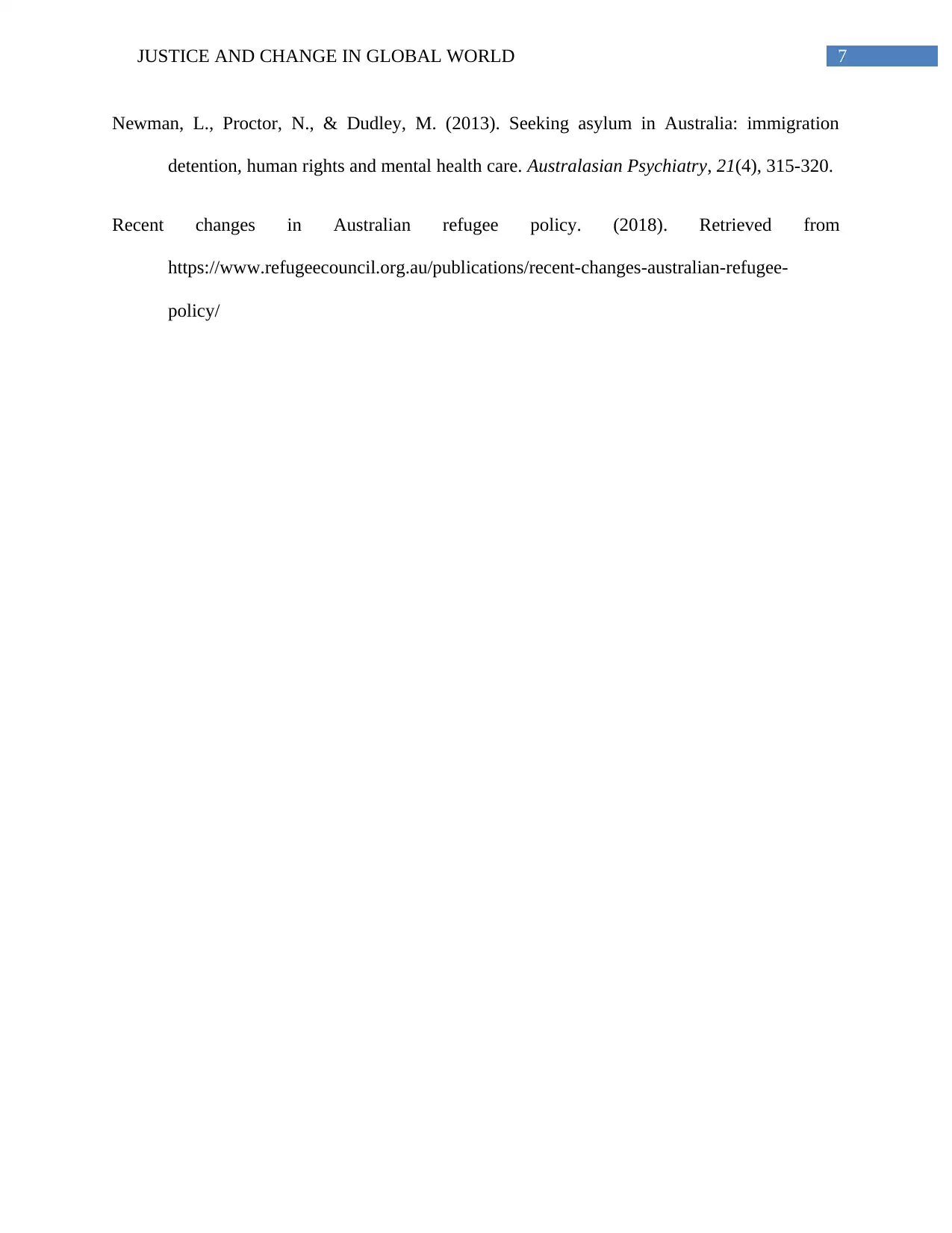
7JUSTICE AND CHANGE IN GLOBAL WORLD
Newman, L., Proctor, N., & Dudley, M. (2013). Seeking asylum in Australia: immigration
detention, human rights and mental health care. Australasian Psychiatry, 21(4), 315-320.
Recent changes in Australian refugee policy. (2018). Retrieved from
https://www.refugeecouncil.org.au/publications/recent-changes-australian-refugee-
policy/
Newman, L., Proctor, N., & Dudley, M. (2013). Seeking asylum in Australia: immigration
detention, human rights and mental health care. Australasian Psychiatry, 21(4), 315-320.
Recent changes in Australian refugee policy. (2018). Retrieved from
https://www.refugeecouncil.org.au/publications/recent-changes-australian-refugee-
policy/
1 out of 8
Related Documents
Your All-in-One AI-Powered Toolkit for Academic Success.
+13062052269
info@desklib.com
Available 24*7 on WhatsApp / Email
![[object Object]](/_next/static/media/star-bottom.7253800d.svg)
Unlock your academic potential
© 2024 | Zucol Services PVT LTD | All rights reserved.





